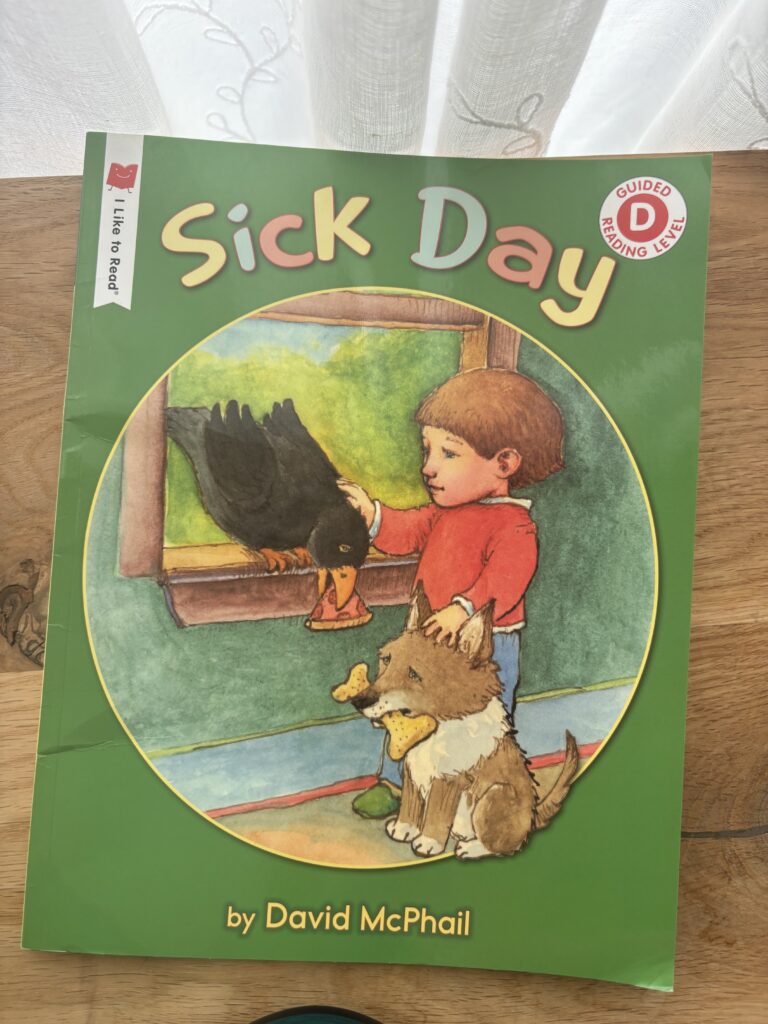Hello!
Today, we have “Sick Day” by David McPhail— a book for beginning readers. I found this book from Oakland University’s compilation of books for beginning readers by Barbara Campbell (2013). Their list is really helpful for those eager to homeschool their kids…
For some, teaching sounds and simple words might seem boring (too easy) but this is not for the teacher but for children…
This world is getting all crazy about technology, IT, web marketing, computer programming—all in the name of $$$. The“1st world” parents (including its leaders) all want the kids to start with those tech-stuff as early as they could. But it’s a NO for me (at least not yet). These precious kids need to build up a foundation first— which is character development. Aided with the know-how of the language they will use very frequently in their future.
Character development is crucial to every child’s success… Character is developed through emotional-awareness practices, regular reflective habits, etc… Reading a story book is just one of the many ways to introduce a child to the world of emotions. It creates a room for self-reflection, mindfulness, and self-awareness as they discover different characters, different thoughts and perspectives. All of which they can connect with their reality…
A reading habit creates the time and the space for a child to discover, explore and/or even strengthen his/her own character. Think of it as having a flight simulation. What are the ways we can support a child’s emotional growth without having any sort of intervention? Have you ever met someone (a child or an adult) who is totally unaware of how to deal with his own emotions, solving his own problems, making decisions in life? It could be that they focused too hard, too early, too often on the hard sciences or any other sort of distractions which usually come automatic these days…
Today, we will focus on well-being and grammar (present simple tense) with the help of David McPhail’s book, “Sick Day”.
Purpose (目的): For children to be aware about well-being habits
Autonomy (自主性): For children to practice well-being habits such as taking a nap, walking a dog, taking some time off…
Progress(進捗): For children to master well-being habits in their early growing/developing years
I. PRE-READING
I.A. Phonics
(short i)- sick, is, him, sit, it, this
(long a)- day, May, say, ate, play
I.B. Unlocking Difficult Words
(The list of words includes very easy words. It is because the students need to somehow feel confident knowing that they know some of the words.)
1.boy
2. bed
3. sick
4. pizza
5. soup
6. bone
7. get well
8. help
9. keep
10. give
11. come
12. go (away)
13. nap
14. cold
15. warm
I.C. Learning Expressions
1. “Don’t eat it!”
2. get sick- get well
I.D. Experiential Questions
What do you usually do/eat/drink when you get sick?
I.E. Motivational Question(s)
T: What do you think can help a sick person feel better?
A: “I think (that)_______ can help a sick person feel better.”
T: Why do you think so?
II. READING
(Read Aloud)
III. POST-READING
III.A. Review answers to motivational Q(s)
III.B. Generalization
A warm blanket, mother’s soup, going out and playing with friends, a nap under a tree can help a sick person feel better.
III.C. Grammar Focus: Present Simple Tense
Part 1.
Ex: Dog (sit, sits).
- Dog (help, helps) him get warm.
- Mom (give, gives) him soup.
- He and Dog (go, goes) out.
- Boy and Dog (sit, sits) with Bird.
- Bird (go, goes) away.
- He (come, comes) back with pizza.
- Dog (jump, jumps) up.
- They (see, sees) Bird.
Part 2. am, is, or are
Boy ___ sick.
He ___ cold.
I ___ sick.
I ___ fine.
Bird ___ fine.
Dog ___ sick.
The bone ___ gone.
Boy, Bird, and Dog ___ all fine.
Part 3. has/have
I ___ soup.
Boy ___ a nap.
Dog ___ the bone.
Bird ___ the pizza.
Amazing when the English teacher studies psychology…
“She talks well-being in her classes.” *wink*
To homeschoolers, may you find this helpful.
Asian Santa
July 25, 2024



コメント